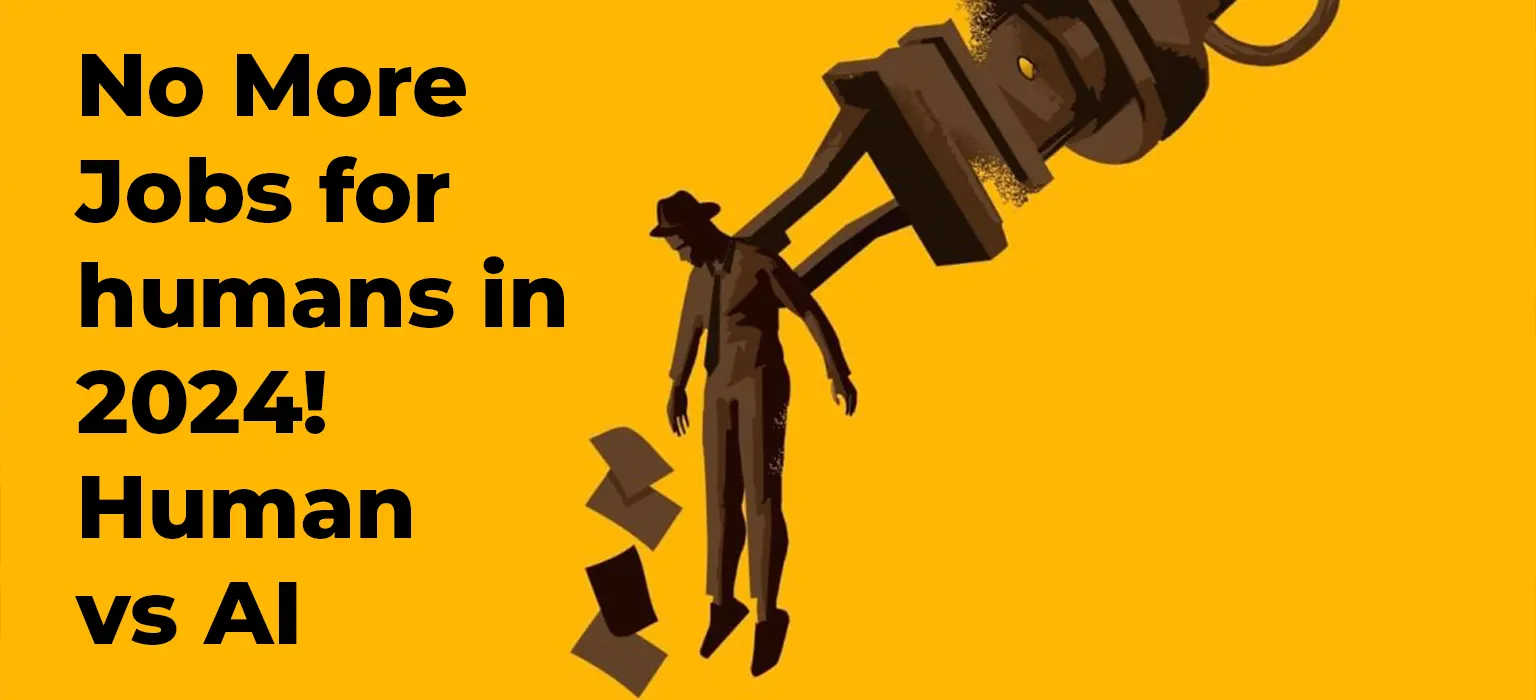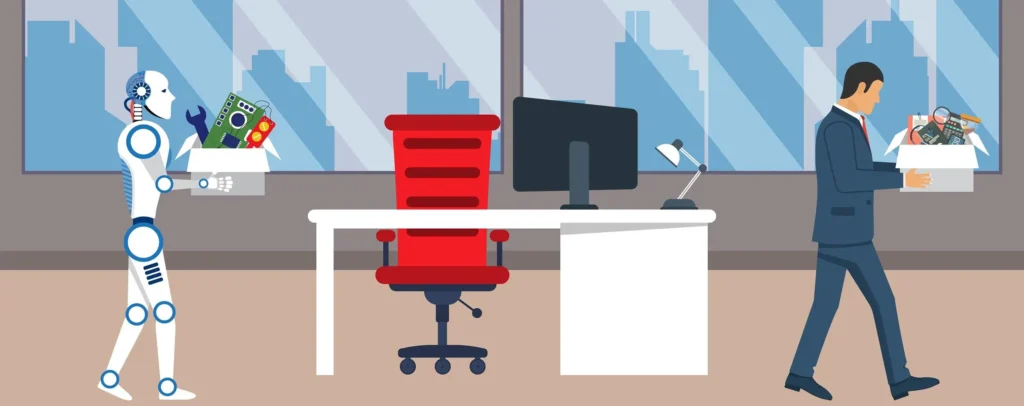
Can AI really replace human workers? Get the jaw-dropping facts about how artificial intelligence and robots are already changing jobs as we know them.
We’ve all heard the ominous warnings that robots and thinking machines will take over many human jobs. But which jobs are most at risk? And is there any hope at all for mere mortals to stay employed when smart algorithms can do practically everything better and faster?
This eye-opening expose reveals the cold, hard truths about AI’s impact on the future of work. You’ll discover which occupations will change the most in the coming years as AI becomes more advanced. And most importantly, you’ll find out if your job could be replaced by a robot!
The Automation Apocalypse – Which Jobs Will AI Transform First?

It’s no secret that artificial intelligence has already started changing the employment landscape. But the pace of change is accelerating rapidly. As smart algorithms continue getting smarter, they take on more and more tasks that used to require human intelligence.
Experts warn that new advances in “generative AI” will affect many of the jobs people currently do. But not all occupations will change equally. According to a recent study by Indeed’s Hiring Lab, some of the most common roles like nurses, caregivers, and chefs are among the 35% least likely to be impacted by AI.
So if you’re a nurse or cook, you can breathe easy for now. But for many other professions, the march of the machines is already disrupting workflows and even making some jobs obsolete.
Jobs That Can Be Done Remotely At Highest Risk?
It turns out that if your job is the kind that can be done remotely, or if it involves software development, there’s a much bigger chance AI will transform what you do. In the worst case, you might even lose your job to a robot!
The extra vulnerability of remote jobs makes sense when you think about it. If you’re a software coder or financial analyst and you never physically interact with coworkers or customers, it’s relatively easy for an AI bot to replace you. An algorithm doesn’t need to actually show up in an office or meet people face-to-face.
So even though remote work has exploded in popularity recently, it carries some worrisome downsides. Namely, if you never leave your home office, you’re an easy target for automation.
Doctors, Lawyers, Coders – The High-Salary Jobs Most At Risk ?
When researchers analyzed which skills are most susceptible to AI, they discovered that high-paying professional roles are in the crosshairs. Doctors, lawyers, accountants, architects, engineers, marketers, and software developers – all these lucrative careers involve tasks like information analysis, data processing, writing, content creation, and predictive modeling.
And those just happen to be exactly the sort of cognitive functions that advanced AI is best at!
So even though specialists in these fields make good money now, their jobs are primed for major upheavals as AI matures. It’s the well-paid knowledge workers who have the most to fear from thinking algorithms.
How AI Will Transform Specific Jobs
Let’s take a closer look at how specific occupations will change in the near future as AI capabilities improve:
Doctors – AI can already outperform human doctors at diagnosing certain illnesses. Algorithms will take over analyzing test results, scanning medical images, and interpreting health data. That leaves the human physician more time for face-to-face meetings with patients. But automation may reduce the number of doctors needed.
Lawyers – Smart legal apps are replacing tasks like document review, contract drafting, and basic legal research. The human lawyer focuses more on strategy, creatively solving legal problems, and interacting with clients. Many paralegal and legal assistant jobs will disappear.
Software Engineers – Programming is ironically one of the easiest jobs for AI to replicate. Generative algorithms can write their own code instead of needing human coders. Engineers will still architect systems but less grunt work of typing code.
Financial Analysts – Predictive algorithms far surpass humans at spotting subtle patterns in massive datasets. Software handles investing analysis, portfolio management, risk assessments and more. The human role evolves to interpreting AI recommendations.
Writers – Natural language AI can generate any type of text, blog posts, social captions, marketing copy, even news articles. Human writers focus more on editing machine-created content instead of writing from scratch. Freelance writing gigs dry up.
Customer Service – Chatbots now handle most basic customer inquiries without human involvement. Automation resolves account issues, processes payments, schedules appointments. Remaining service agents deal with complex complaints.
Office Admins – Scheduling meetings, booking travel, transcribing recordings, filling out forms – these administrative tasks are all simple for algorithms. Fewer assistants needed in corporate offices.
In almost every white-collar sector, the story is similar. AI takes over routine cognitive jobs, while humans move into supervision, quality control and troubleshooting.
The Big Winners – Jobs That Need Human Touch
Meanwhile, the jobs least prone to automation involve skills that are uniquely human. Physical jobs like construction, farming, and repairing things require dexterity, mobility, and perception that robots still lack.
Interpersonal jobs with high emotional intelligence and empathy are also safe for now. Nurses, therapists, social workers, and teachers provide care, guidance and mentoring. Their ability to understand feelings and relate to people can’t easily be replicated by machines.
Likewise, creative fields that generate art, ideas, and culture rely exclusively on human ingenuity. We won’t see robot novelists, comedians, musicians, or fashion designers anytime soon.
So while highly analytical and data-focused careers take major hits from automation, work involving physical labor, human interaction, or imagination will stay dominated by flesh-and-blood workers.
AI Job Loss Leading To Inequality?
There’s no question that lower-paid, routine jobs like data entry clerks, factory workers, drivers and fast food workers are the most vulnerable to machines taking over. Self-driving trucks are already on the roads, and burger-flipping robots are serving up hot fast food.
By contrast, high-salary professionals have the resources and education to keep upgrading their skills. Lawyers, bankers, doctors and engineers will actively augment their expertise using AI instead of being replaced.
This means income and opportunity gaps between average workers and elites could get even wider. While doctors utilize AI to make faster medical diagnoses, the truck driver may be staring at long-term unemployment because of self-driving technology.
Some even predict a dystopian future where a small tech-savvy elite class controls the AI and lives in luxury. Meanwhile, lower skill workers lose their jobs en masse and struggle in poverty as automation fills in for them.
Preventing such a polarized world requires ensuring education and retraining programs are available to all. That may allow more people to transition from routine jobs to roles that involve creativity, human emotional intelligence, or advanced technical skills.
Adapting Skills Instead Of Finding New Careers
Luckily, it may not always be necessary to embark on an entirely new career to survive the automation onslaught. Very often, adapting existing skills will be sufficient.
Just like the invention of pocket calculators didn’t eliminate the need for math experts, the rise of generative AI doesn’t mean human skills are obsolete. It simply changes the nature of the work.
Having algorithms handle scheduling meetings or drafting status reports frees up the human professional to focus less on clerical tasks and more on big picture strategy.
For example, a real estate agent can utilize AI to create detailed listings and sales reports automatically. This gives them extra time to understand the unique needs of home buyers and cultivate more customer relationships. Their core skills evolve from manual paperwork to personal advisory services based on human emotional intelligence.
Likewise teachers, despite fears that online lessons may replace them, will have improved capacity for one-on-one tutoring and mentoring if AI handles grading assignments. Doctors with less time spent analyzing charts can better tend to patients’ anxieties. Experts across fields integrate AI as a productivity accelerator while doubling down on human connections.
In many cases, becoming power users of creative AI will be sufficient. Instead of the trauma of changing professions, professionals simply expand their capabilities.
AI Job Risk Calls For Ethical Response
As exciting as the AI productivity boost promises to be, it’s critical we grapple with some ethical dilemmas.
If high-skill jobs like financial analysis integrate AI faster, while lower-skill roles like driving trucks lose out entirely, that risks exacerbating inequality. Those already privileged with advanced education have the inside track to benefit from algorithms.
We can’t allow social divisions to intensify just because of asymmetrical AI adoption across professions. Deliberate policy decisions must promote skills retraining and educational opportunities for those most disrupted by automation.
Also, certain human-centric roles could lose their essence if core activities get delegated to AI. For example, a doctor’s bedside manner is crucial for healing beyond just diagnosing illness. But over-reliance on AI for communicating test results to patients erodes personal relationships. Human emotional intelligence gets devalued.
Likewise, automating away mundane facets of creative occupations robs them of textures that make the final output compelling. If an architect offloads design blueprints and modeling entirely to algorithms, the finished buildings lose depth and richness.
Humans in these fields can’t let AI domination diminish the aspects of their work centered on inspiration, relationships, empathy and meaning. The tasks that look routine from the outside are often vital for nurturance of the human spirit.
Final Words
Whatever your current job, it’s evident that AI will transform if not replace many existing roles in coming years. From truck drivers and factory workers to financial analysts, doctors and marketers, no occupation today looks safe from disruption by smart algorithms.
Rather than panic or deny this reality, the wise course is getting out ahead of automation trends in your field. Start experimenting with AI tools that can make you more productive. Identify the deeply human aspects of your work that algorithms can’t replicate, and double down on sharpening those skills.
Meanwhile, policymakers and business leaders need to prioritize retraining programs and new educational pathways. This will allow those displaced by AI to transition into emerging roles instead of getting left behind.
With conscientious planning and upgrading of skills, both by individuals and institutions, we can harness automation to create more meaningful careers. The march of thinking machines toward human-level intelligence is inevitable. But we still have agency over how that future unfolds. By embracing AI proactively, with compassion for those most impacted, we can build a world where human augmentation enables society to flourish instead of holding it back.
Read More :-
- IBM Boss Says ,You Won’t Need Degree to Get a Job In tech , Thanks to AI
- Mind-Blowing Brain AI Tech Lets People Control Computers with Their Thoughts
- Google Putting AI in Android Auto for Some Reason from 2024
- Apple Watch Got Banned! Here is 6 best Apple Watch Alternatives 2024
- Is 2024 the Year of the AI Phone’s ?
